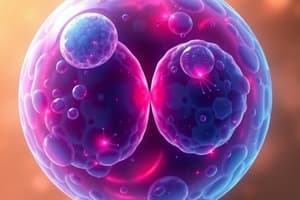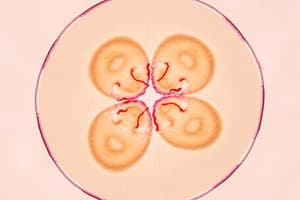Podcast
Questions and Answers
Wat gebeurt er tijdens de anafase?
Wat gebeurt er tijdens de anafase?
- De kernomhulsel ontbindt zich.
- Zusterchromatiden scheiden en worden naar de tegenovergestelde polen getrokken. (correct)
- Spindelfibers worden gevormd.
- Chromosomen worden gekopieerd.
De controlepunten in de celcyclus zorgen ervoor dat beschadigde cellen zich kunnen delen.
De controlepunten in de celcyclus zorgen ervoor dat beschadigde cellen zich kunnen delen.
False (B)
Wat is het primaire doel van meiose?
Wat is het primaire doel van meiose?
Het creëren van gameten (sekse cellen).
____ is een proces dat wordt gebruikt door prokaryoten voor celdeling.
____ is een proces dat wordt gebruikt door prokaryoten voor celdeling.
Koppel de celcyclusfasen aan hun functies:
Koppel de celcyclusfasen aan hun functies:
Wat is het belangrijkste doel van mitose?
Wat is het belangrijkste doel van mitose?
Meiose leidt tot de productie van twee diploïde dochtercellen.
Meiose leidt tot de productie van twee diploïde dochtercellen.
Noem de vier fasen van mitose.
Noem de vier fasen van mitose.
Tijdens _____ worden homologe chromosomen gescheiden.
Tijdens _____ worden homologe chromosomen gescheiden.
Koppel de fasen van mitose aan hun juiste beschrijvingen:
Koppel de fasen van mitose aan hun juiste beschrijvingen:
Welke gebeurtenis zorgt voor genetische variatie tijdens meiose?
Welke gebeurtenis zorgt voor genetische variatie tijdens meiose?
Cytokinese gebeurt tegelijk met telofase tijdens mitose.
Cytokinese gebeurt tegelijk met telofase tijdens mitose.
De eindproduct van meiose zijn _____ dochtercellen.
De eindproduct van meiose zijn _____ dochtercellen.
Flashcards
Anafase
Anafase
De zuschromatiden scheiden zich aan het centromeer en worden naar tegenovergestelde polen van de cel getrokken door het verkorten van de spoelvezels.
Mitosis
Mitosis
Celdeling in lichaamscellen.
Celcyclus controles
Celcyclus controles
Regelen de voortgang door de celcyclus om DNA-fouten te voorkomen en de deling van beschadigde cellen te stoppen.
Kanker
Kanker
Signup and view all the flashcards
Meiose
Meiose
Signup and view all the flashcards
Profase (Mitose)
Profase (Mitose)
Signup and view all the flashcards
Metafase (Mitose)
Metafase (Mitose)
Signup and view all the flashcards
Anafase (Mitose)
Anafase (Mitose)
Signup and view all the flashcards
Telofase (Mitose)
Telofase (Mitose)
Signup and view all the flashcards
Crossing over
Crossing over
Signup and view all the flashcards
Independente assortiment
Independente assortiment
Signup and view all the flashcards
Study Notes
Cell Reproduction Overview
- Cell reproduction is essential for growth, development, and repair in multicellular organisms.
- Two main types of cell reproduction: mitosis and meiosis.
Mitosis
- Mitosis is a type of cell division that produces two genetically identical daughter cells from a single parent cell.
- Crucial for growth, repair, and asexual reproduction in many organisms.
- Four main phases: prophase, metaphase, anaphase, and telophase.
- Prophase: Chromosomes condense and become visible. The nuclear membrane breaks down, and spindle fibers form.
- Metaphase: Chromosomes align at the metaphase plate (equator of the cell).
- Anaphase: Sister chromatids separate and move to opposite poles of the cell.
- Telophase: Chromosomes decondense, nuclear membranes reform, and the cell begins to divide. Cytokinesis, the division of the cytoplasm, occurs concurrently with telophase, producing two separate daughter cells.
- Key outcome: Two identical diploid daughter cells.
Meiosis
- Meiosis is a type of cell division that produces four genetically unique haploid daughter cells from a single parent cell.
- Crucial for sexual reproduction, producing gametes (sperm and eggs).
- Two rounds of division: meiosis I and meiosis II.
- Meiosis I: Reductional division, separating homologous chromosomes.
- Meiosis II: Equational division, separating sister chromatids. Similar to mitosis.
- Key events specific to meiosis:
- Crossing over: Exchange of genetic material between homologous chromosomes during prophase I.
- Independent assortment: Random alignment of homologous chromosomes during metaphase I, leading to genetic variation in the daughter cells.
- Key outcome: Four genetically unique haploid daughter cells.
Phases of Mitosis
-
Prophase (Early): Chromatin condenses into visible chromosomes. Each chromosome consists of two sister chromatids joined at the centromere. Centrosomes move to opposite poles of the cell, beginning formation of the mitotic spindle. The nuclear envelope breaks down.
-
Prophase (Late): Spindle fibers attach to the kinetochores on the centromeres of chromosomes. Chromosomes begin to move towards the center of the cell.
-
Metaphase: Chromosomes are aligned at the metaphase plate (the center of the cell), ensuring that each daughter cell receives one copy of each chromosome. Spindle fibers are fully developed and connect to the centromeres.
-
Anaphase: Sister chromatids separate at the centromere and are pulled towards opposite poles of the cell by the shortening of the spindle fibers.
-
Telophase: The chromosomes arrive at the poles, and the nuclear envelope reforms around each set of chromosomes. The chromosomes begin to decondense. Spindle fibers disassemble.
Regulation of Cell Reproduction
- Cell cycle checkpoints control the progression through the cell cycle.
- These checkpoints ensure that DNA is accurately replicated and that damaged cells do not divide, thus preventing potential errors and unregulated growth.
- Key proteins like cyclins and cyclin-dependent kinases (cdks) regulate these checkpoints.
Types of Cell Division in Organisms
- Mitosis happens in somatic (body) cells.
- Meiosis creates gametes (sex cells).
- Binary fission is used by prokaryotes (bacteria). A single cell divides into two by replicating its genetic material and dividing its cytoplasm.
Errors and consequences of uncontrolled cell division
- Mistakes during cell division can lead to mutations and chromosomal abnormalities.
- Uncontrolled cell division is a hallmark of cancer.
- Growth, repair, reproduction, and development all rely on the proper management of the cell division process.
Studying That Suits You
Use AI to generate personalized quizzes and flashcards to suit your learning preferences.




